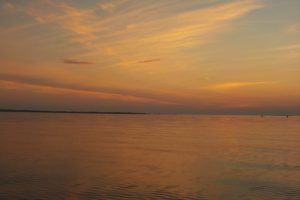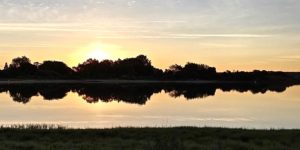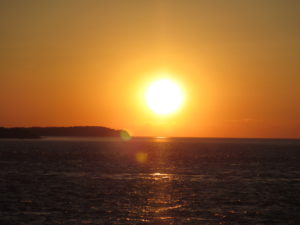
Rachel Carson once said, “In an age when man has forgotten his origins, and is blind even to his most essential needs for survival, water along with other resources has become the victim of his indifference.” Dr. Carson’s impact on the environment resonates with each tweet of a songbird. There are no silent springs because of her.
I would like to express my belief that our environment is crying so loud, it’s deafening, and until WE, collectively, have the courage to stand up for the health and healing of the environment, we will all be victims.
It has been scientifically documented that the water quality of our East Hampton watersheds is impaired. There are harmful algal blooms, low oxygen levels, and excessive bacterial contamination leading to shellfish and bathing beach closures. Relying on our county, state, and federal governments’ environmental protection policies and protocols has failed to protect the health of our environment. It is therefore our responsibility to shout as loud as we can, to voice our demands for ecological recovery. For without it, we are surely doomed.

The East Hampton Town Board has drafted a funding plan to restore what we have harmed. Our watersheds contribute to an East End way of life that is unique and special. Taking steps to address water pollution is vital for our health, and our economy. No matter how rich you are, when you lose your health you lose everything. Knowing that all things are interconnected, that man is only a part of the greater whole, we need to realize that when we harm the environment, we are harming ourselves.
Taking 20% of the CPF Fund to restore the quality and health of our water estuaries is a measure that will protect our Town’s significant scenic vistas, water estuaries, and natural landscapes for future generations. For the last 18 years, the CPF Fund has played a pivotal role in protecting the unique character of our community. With this CPF money, the Town will be able to reduce pollution, mitigate for future pollution, and create restoration projects.
I will bookend this blog post with another insightful quote by Rachel Carson. “We stand now where two roads diverge. But unlike the roads in Robert Frost's familiar poem, they are not equally fair. The road we have long been traveling is deceptively easy, a smooth superhighway on which we progress with great speed, but at its end lies disaster. The other fork of the road—the one ‘less traveled by’— offers our last, our only chance to reach a destination that assures the preservation of the earth.”

 Rachel Carson once said, “In an age when man has forgotten his origins, and is blind even to his most essential needs for survival, water along with other resources has become the victim of his indifference.” Dr. Carson’s impact on the environment resonates with each tweet of a songbird. There are no silent springs because of her.
I would like to express my belief that our environment is crying so loud, it’s deafening, and until WE, collectively, have the courage to stand up for the health and healing of the environment, we will all be victims.
It has been scientifically documented that the water quality of our East Hampton watersheds is impaired. There are harmful algal blooms, low oxygen levels, and excessive bacterial contamination leading to shellfish and bathing beach closures. Relying on our county, state, and federal governments’ environmental protection policies and protocols has failed to protect the health of our environment. It is therefore our responsibility to shout as loud as we can, to voice our demands for ecological recovery. For without it, we are surely doomed.
Rachel Carson once said, “In an age when man has forgotten his origins, and is blind even to his most essential needs for survival, water along with other resources has become the victim of his indifference.” Dr. Carson’s impact on the environment resonates with each tweet of a songbird. There are no silent springs because of her.
I would like to express my belief that our environment is crying so loud, it’s deafening, and until WE, collectively, have the courage to stand up for the health and healing of the environment, we will all be victims.
It has been scientifically documented that the water quality of our East Hampton watersheds is impaired. There are harmful algal blooms, low oxygen levels, and excessive bacterial contamination leading to shellfish and bathing beach closures. Relying on our county, state, and federal governments’ environmental protection policies and protocols has failed to protect the health of our environment. It is therefore our responsibility to shout as loud as we can, to voice our demands for ecological recovery. For without it, we are surely doomed.
 The East Hampton Town Board has drafted a funding plan to restore what we have harmed. Our watersheds contribute to an East End way of life that is unique and special. Taking steps to address water pollution is vital for our health, and our economy. No matter how rich you are, when you lose your health you lose everything. Knowing that all things are interconnected, that man is only a part of the greater whole, we need to realize that when we harm the environment, we are harming ourselves.
Taking 20% of the CPF Fund to restore the quality and health of our water estuaries is a measure that will protect our Town’s significant scenic vistas, water estuaries, and natural landscapes for future generations. For the last 18 years, the CPF Fund has played a pivotal role in protecting the unique character of our community. With this CPF money, the Town will be able to reduce pollution, mitigate for future pollution, and create restoration projects.
I will bookend this blog post with another insightful quote by Rachel Carson. “We stand now where two roads diverge. But unlike the roads in Robert Frost's familiar poem, they are not equally fair. The road we have long been traveling is deceptively easy, a smooth superhighway on which we progress with great speed, but at its end lies disaster. The other fork of the road—the one ‘less traveled by’— offers our last, our only chance to reach a destination that assures the preservation of the earth.”
The East Hampton Town Board has drafted a funding plan to restore what we have harmed. Our watersheds contribute to an East End way of life that is unique and special. Taking steps to address water pollution is vital for our health, and our economy. No matter how rich you are, when you lose your health you lose everything. Knowing that all things are interconnected, that man is only a part of the greater whole, we need to realize that when we harm the environment, we are harming ourselves.
Taking 20% of the CPF Fund to restore the quality and health of our water estuaries is a measure that will protect our Town’s significant scenic vistas, water estuaries, and natural landscapes for future generations. For the last 18 years, the CPF Fund has played a pivotal role in protecting the unique character of our community. With this CPF money, the Town will be able to reduce pollution, mitigate for future pollution, and create restoration projects.
I will bookend this blog post with another insightful quote by Rachel Carson. “We stand now where two roads diverge. But unlike the roads in Robert Frost's familiar poem, they are not equally fair. The road we have long been traveling is deceptively easy, a smooth superhighway on which we progress with great speed, but at its end lies disaster. The other fork of the road—the one ‘less traveled by’— offers our last, our only chance to reach a destination that assures the preservation of the earth.”


